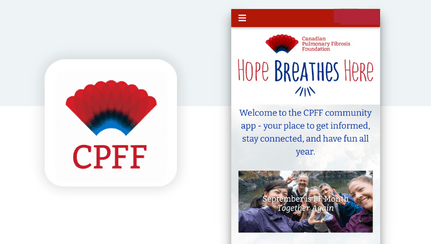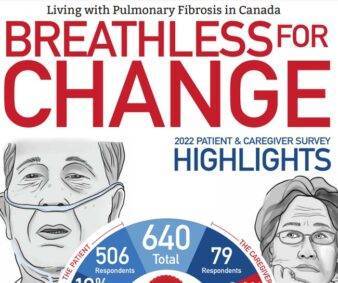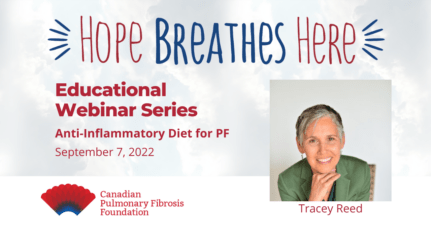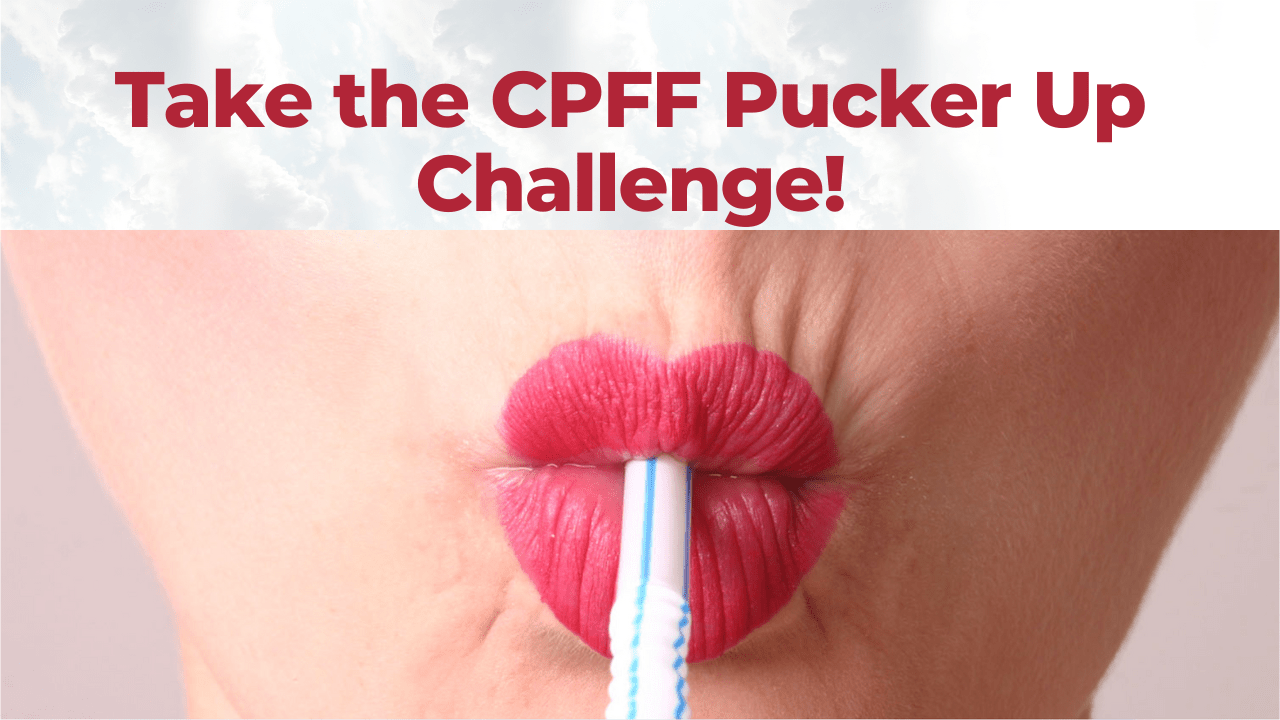It’s Pulmonary Fibrosis Awareness Month
While events and activities are well underway, it’s not too late to get involved in Pulmonary Fibrosis Awareness Month. Register for our national “virtual” walk, and add your kilometres to the national total. We’re aiming for a walk across the country – a total of 6,818 kilometres.
A few community walks and events have taken place already, but there are still some outstanding. Check them out and consider taking part.

“We are pleased to report that as of September 12, 2022, Pulmonary Fibrosis Awareness Month is fostering plenty of attention and has raised more than $60,000 towards our $100,000 goal,” says Sharon Lee, Executive Director, Canadian Pulmonary Fibrosis Foundation (CPFF).
Another great way to get involved and raise awareness about PF and the effect it has on something most of us take for granted – breathing – is to take the “Pucker Up Challenge.” All you need is a drinking straw and the desire to get the word out about PF.
“People living with pulmonary fibrosis experience shortness of breath as the disease progresses,” says Lee. “Some have described the feeling like trying to breathe through a drinking straw, while others mention being ‘tethered’ to their supplemental oxygen source.”
Grab a drinking straw, then pucker up and… breathe! Try blocking your nose with the other hand, and just breathe through the straw. Imagine what it’s like to be conscious of every breath. Can you do it for five consecutive breaths? Have a friend take a photo or video of you doing the challenge and share it on CPFF’s social media platforms, as well as your own.
CPFF’s social media messages have had more than 250,000 views so far this month. We’ve also reached out to media outlets across the country and coverage so far has included: CTV Calgary, CTV Saskatoon, CTV Montreal, CTV Halifax, Take 5, AM 800 Windsor and Kawarthas411.ca, as well as a community newspaper in Montreal.
Landmarks across the country are also being lit in red and blue to mark our Awareness Month. Among many others are: Nanaimo Bastion, Ladysmith City Hall, Mississauga Civic Centre and Montreal Olympic Park. Keep an eye out in your community for monuments lit up for us all.

To stay connected and informed during Awareness Month, download the CPFF Community App. Browse upcoming educational webinars, community walks and events, plus monument lightings. Connect with others in the CPFF community, post your PF walk kms, participate in CPFF challenges and more. There’s even a “play-to-win” option where you can complete challenges and earn points for a chance to win prizes like CPFF t-shirts, caps and bracelets, as well as gift cards.
Explore the CPFF Community app today! Browse from your computer: https://eventmobi.com/cpff/.
There are still plenty of ways to take part in Pulmonary Fibrosis Awareness Month, including the “Pucker Up Challenge” or register for our national, virtual, walk across the country.
Ask your MPP/MLA to support Awareness Month
As part of Pulmonary Fibrosis Awareness Month, we’re asking you each to reach out to your MPP or MLA and ask them show their support with a 30-second video message to be shared with our community and the public.
A ready-to-go email request as been created to make the process easy. You do not even need to look up the name or email of your MPP or MLA. The form with your address will direct it to the right person.
The request mentions that if they wish, they can take the “Pucker Up Challenge” and submit it as their video of support. Elected officials can also find all the information they need on the various events and activities taking place during Pulmonary Fibrosis Awareness Month 2022 on CPFF’s website.
Please reach out to your elected representative today to help everyone in our PF Community. Use our ready-to-go email request.
2022 Patient and caregiver survey results highlights
This spring we asked you to complete a survey about your experiences living with pulmonary fibrosis (PF), its impact on your life and what you need for your future. More than 640 people living with PF and their caregivers from across the country responded to our call. Thank you!
Highlights of the survey results were released earlier this month as part of Pulmonary Fibrosis Awareness Month. The full survey report should be available early next month. A media release was sent out earlier this month to highlight for the public many of the struggles facing our PF Community.
One of the most devastating results is that oxygen is unacceptably scarce for some Canadians, with 20 per cent of pulmonary fibrosis (PF) patients experiencing delays in accessing oxygen when they needed it. Six in 10 reported that supplemental oxygen had a large negative impact on their lives and more than one third have no backup oxygen in the event of a power failure.
Since the last survey was released in 2020, conditions for those affected with PF have gotten worse. Patients are still facing many significant barriers to receiving effective treatment, specifically in the areas of diagnosis and access to treatments – one in three patients with PF wait up to three years for their diagnosis.

“Our 2022 Patient and caregiver survey results highlight the need for change and action,” says Sharon Lee, Executive Director of the Canadian Pulmonary Fibrosis Foundation (CPFF). “These results are disheartening, but we need to keep fighting for change, and with increased awareness and continued investment, we believe we can help lessen the countless burdens this terrible disease has on people across this country.”
Other survey results reveal that one in five people need, yet do not receive, counselling or emotional support and one in six are in need of, yet do not receive, physiotherapy and palliative care. Overall, one third of respondents don’t feel they have effective care, and among visible minorities that number rises to fifty per cent.
While some of these increasing gaps in care during the past two years may be attributable to the pandemic, it cannot account for them all.
In the coming year, CPFF will focus its advocacy efforts on ensuring people with PF have access to the oxygen therapy they need, when they need it, regardless of where they live in the country. And the Foundation will continue its mission to educate and raise awareness, support patients and caregivers, invest in research that benefits patients and give a voice to patients.
Never stop learning
During Pulmonary Fibrosis Awareness Month, we’ve lined up some great speakers delivering webinars to expand your knowledge of PF and related topics. You can access the educational sessions listed online. If you cannot make the allotted time, don’t fret. Recorded sessions will be posted on our website within a week of the original broadcast for viewing anytime and anywhere.
You can also access all of the upcoming webinars on the CPFF app. (See the first article in this issue for details on how to download the app on your Smart phone or browser.) It is a breeze to just click to watch and listen live or to view the recorded version.
As of publication, we’ve had four experts share their insights with us this month. Last week, nutritional consultant Tracey Reed spoke about an “Anti-inflammatory diet for PF,” and Dr. Richard Allen shared his work on “The genetics of PF.” You can read about the highlights of Ms. Reed’s presentation in the next article. Dr. Allen’s session was similar to the one he delivered for the EU-IPFF in May. You can read highlights of his presentation in the June issue of this publication. Again, videos of both Canadian broadcast presentations will be available on our website.
This week, we heard from Audrey Bond, the creator of “Vaultt: An app for patients and caregivers,” about digital tools to help you track and manage your disease and Dr. Marcelo Cypel on “Creating universal blood type organs for transplant” an exciting advance in lung transplantation. If you missed them, these sessions will be available online next week.
On Thursday, September 15 at 1:30 p.m., Karine Diedrich from the Canadian Hospice and Palliative Care Association will hold a session on “Advance Care Planning.” And another four education webinars are planned for the last two weeks of September. Check them out now and mark your calendar.
We want to thank our presenters for taking the time to share their work and expertise with our PF Community. We also want to thank each member of our audiences for continuing to learn and educate yourself about PF.
Mark your calendar today for one of our upcoming webinars during Pulmonary Fibrosis Awareness Month or watch the recorded versions online whenever you like.
Consider an anti-inflammatory diet for PF

A self-described “Gut Geek,” certified holistic nutritional consultant Tracey Reed shared her insights in a presentation titled “Anti-inflammatory diet for pulmonary fibrosis,” on September 7. She explained how adding anti-inflammatory foods and replacing sugar and other inflammatory foods in your diet can reduce lung inflammation, prevent lung injury and how early research is showing that it may even help prevent lung fibrosis.
What are anti-inflammatory foods? No surprise, most of them are brightly coloured and flavourful fruits and vegetables, which contain polyphenols, the compounds that make them so colourful and delicious. Polyphenols also make them anti-inflammatory.
“Eat from the rainbow.” Reed says. “Your lungs will love it.” She also recommends variety in your fruit and vegetable choices. The next time you grocery shop, choose two or three fruits or vegetables that you would not normally buy. And they don’t need to be fresh, which can be more expensive in the winter months. Frozen fruits and vegetables are picked at their peak and deliver just as many nutrients as anything fresh that is transported over long distances.
As for cooking these anti-inflammatory gems, eating them raw, steamed, stir-fried and roasted are all good options. “Variety in cooking methods is good,” says Reed, “since some nutrients are best absorbed when the food is cooked.” When grilling, cook low and slow to minimize the black char on foods, which can be carcinogenic.
A few other tips on eating an anti-inflammatory diet shared by Reed, include:
- Herbs and spices also have anti-inflammatory properties and taste great. Use ginger, garlic, turmeric and leafy green herbs like basil, coriander, oregano and parsley, etc.
- We need oils and fats in our diet. Limit corn and canola oils as they are very high in omega-6 fatty acids which are very inflammatory. In fact next to sugar, this is probably the biggest problem in the processed food industry. Choose anti-inflammatory oils like olive oil, ghee (a specific type of clarified butter), cocoanut oil and avocado oil. (Note: Avocado oil should be neutral in taste. If it is not tasteless, it is probably rancid and should not be eaten.)
- Table sugar contains no minerals or vitamins. Sugar is inflammatory and impairs the immune function, making it more difficult to fight infections. Replace sugar with nutritive sweeteners like dried fruit, dark chocolate (80 per cent or higher of cocoa), honey or maple syrup. Dates, mashed into a paste, can also sweeten many foods. Consume even nutritive sweeteners in moderation.
- Eat the whole fruit, rather than drinking fruit juices, which contain a great deal of natural sugar. In the whole fruit, the sugar binds with the fibre, moderating its glycemic index (rate of absorption).
- Some foods, such as fermented vegetables and collagen-rich foods may be beneficial for the general population, but may pose risks for people with chronic conditions. It is best to consult with a dietician or nutritionist and your clinician and pharmacist when pursuing dietary changes. There may be impacts on your condition, or the effectiveness of your medications, to consider, when making changes to your diet.
At the end of her presentation, Reed shared recipes for a cabbage, apple and fennel slaw and an anti-inflammatory salad dressing.

Reed will also be offering three other nutritional webinars in the coming months. Be sure to check our event calendar, the CPFF app and our social media platforms as dates and times are confirmed.
Check out our new website

Just in time for Pulmonary Fibrosis Awareness Month, CPFF has launched its new and improved website, with a fresh new look, plenty of new and updated information, along with an all-important search function.
You’ll still find us at www.cpff.ca. The aim of our new website is to provide you with an easy-to-use site with credible information that you can use.
Of special note is the new Pulmonary Fibrosis Resource Library to help you better understand what PF is, the causes, symptoms and what to expect as PF progresses. Topics are arranged under headings covering everything from diagnosis, treatment & care, managing PF, support group resources, COVID-19, CPFF reports and newsletters, as well as provincial resources for pulmonary fibrosis medical care and support and national and international information about clinical trials.
Take a few moments, or longer, to get acquainted with the new website and let us know what you think. If you have any questions, or have some feedback you’d like to share, please send your comments and/or suggestions to [email protected].








